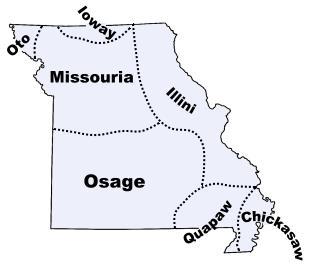Missouri Trails To The Past
Native Americans of Missouri
 The
Missouri Indians were part of the Southern Sioux tribes who lived along the
Missouri River near the present-day border of Missouri and Nebraska. They were
buffalo-hunters and farmers who lived in oven-shaped, earth-covered houses
grouped into towns.
The
Missouri Indians were part of the Southern Sioux tribes who lived along the
Missouri River near the present-day border of Missouri and Nebraska. They were
buffalo-hunters and farmers who lived in oven-shaped, earth-covered houses
grouped into towns.
Smallpox had depleted their numbers, so the surviving Missouri Indians lived with the neighboring Oto Indians. Combined, these bands included about 250 people.
Many of the Missouris and Otos were away hunting buffalo when the Lewis and Clark expedition encountered their towns in July 1804. The Corps sent out two men to search for the Indians but came up empty. The captains decided to proceed up the river.
On August 2, a small group of Missouris and Otos arrived at the Corps’ camp site, which Clark had named Council Bluff - across and downriver from what is now Council Bluffs, Iowa. The leading chiefs were still away hunting, but Lewis and Clark invited six or seven lesser chiefs to a council the next morning.
On August 3, with great ceremony, Lewis and Clark held the first formal meeting between representatives of the United States and western Indians. The Indians observed as the soldiers marched in full regalia and demonstrated their skills with weaponry. The Corps’ show of decorum and military strength would establish the routine for subsequent councils.
During the council, the Indians were told they were the “children” of a new “great father” who would provide them with trade and protection in place of their unreliable commerce with the French and the Spanish. It was a speech Lewis would deliver to numerous tribes throughout the journey.
The Missouris were advised to make peace with other Indian tribes in order to bring the trade Lewis promised. He also urged the chiefs to send a delegation east to visit President Jefferson. When Lewis concluded, each chief received gifts including a peace medal and face paint.
On August 18, the leading Missouri chief, Big Horse, and main Oto chief, Little Thief, met with the Corps. Lewis gave his speech, but Big Horse responded with pointed requests for goods and whiskey. The Corps gave them tobacco, paint and beads, but the Missouri warriors were not satisfied and went away unhappy. Before departing, Little Thief indicated he would go to Washington in the spring.
In March 1805, a delegation including one Missouri chief and Little Thief met in Washington, D.C., with President Jefferson, who promised trade goods and told them he hoped for peace.